The Origins of Real Estate Agent Commission in U.S. Home Sales
The commission-based model that frames modern residential brokerage emerged alongside the professionalization of real estate in the early twentieth century. Local boards developed rules that rewarded cooperation among firms and introduced a simple, contingent fee structure: no sale, no payment; sale consummated, fee paid as a percentage of price.
Because the seller controlled the asset and the listing agreement, the seller naturally became the party to promise payment, which then covered both the listing firm and the cooperating firm that procured the buyer.
As the model spread, it hardened into consumer expectations and shaped the language that still circulates in open houses and first-time buyer seminars: “you don’t pay us; the seller pays us.” Over time, that phrase drifted away from an explanation of agency mechanics and calcified into a myth that representation is free to consumers.
It is not free, and the costs live in the very place where most consumers least expect to find them: the price itself, amortized through the loan, and converted into interest expense over decades.
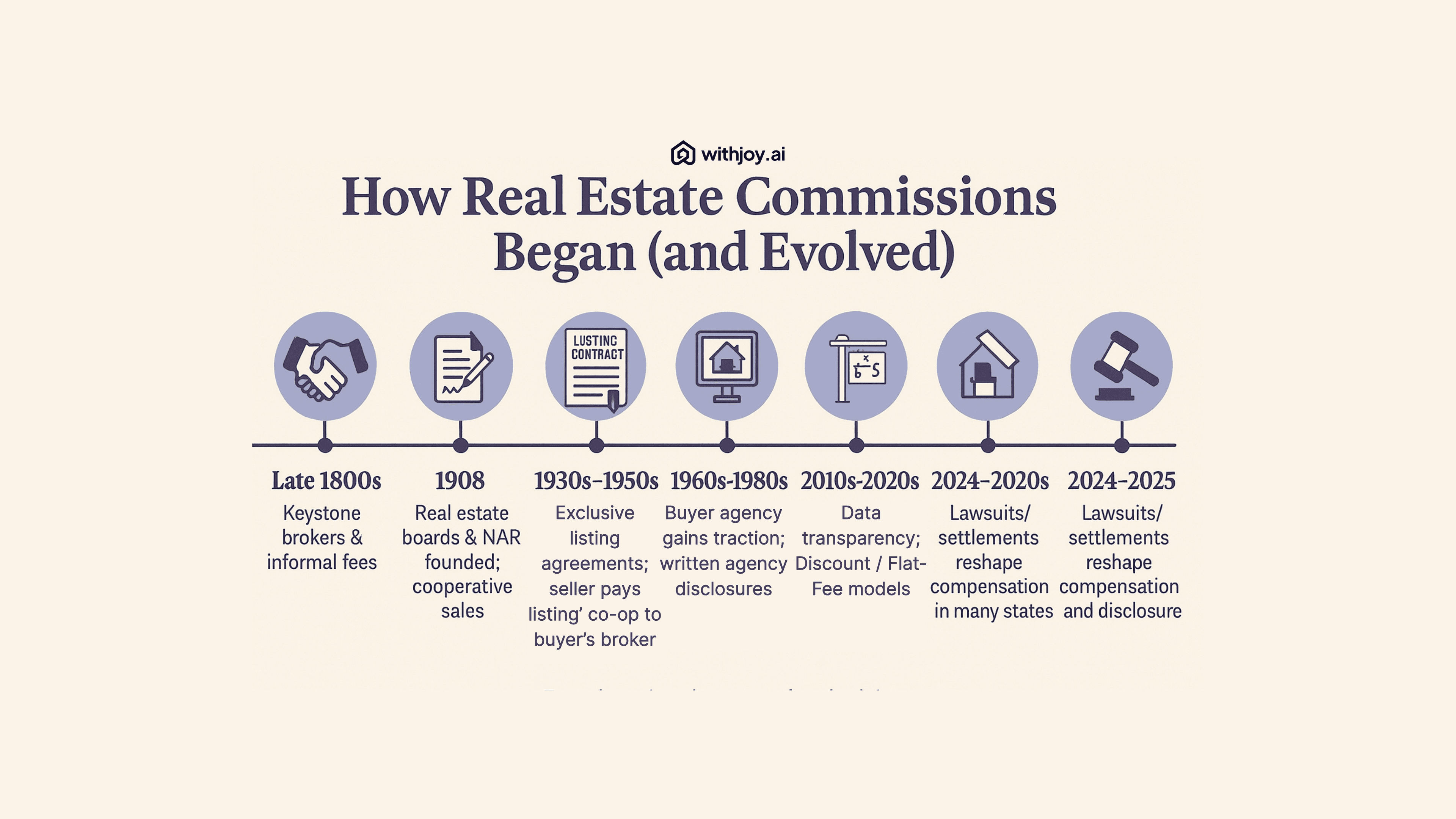
How Compensation Flows in a Modern Real Estate Transaction
A contemporary listing agreement typically sets out a total commission as a percentage or as a flat dollar figure. The listing then communicates an offer of buyer’s agent commission to cooperating firms, or the parties negotiate compensation within the purchase process when the offer is silent or constrained.
When the transaction closes, escrow disburses per the settlement statement and the listing instructions, and the listing broker and buyer’s broker split the compensation according to their inter-firm agreement, after which each firm pays its affiliated licensees as their internal policies dictate.
From the buyer’s perspective, no line labeled “real estate agent fees” appears in the section they sign to authorize payment, yet the price on which lender, appraiser, and title officer converge embeds the fees; therefore the buyer’s loan and the buyer’s down payment cumulatively carry them.
The fact that the buyer does not cut a separate check is legally significant but economically beside the point: costs you finance are still costs buyer's pay.
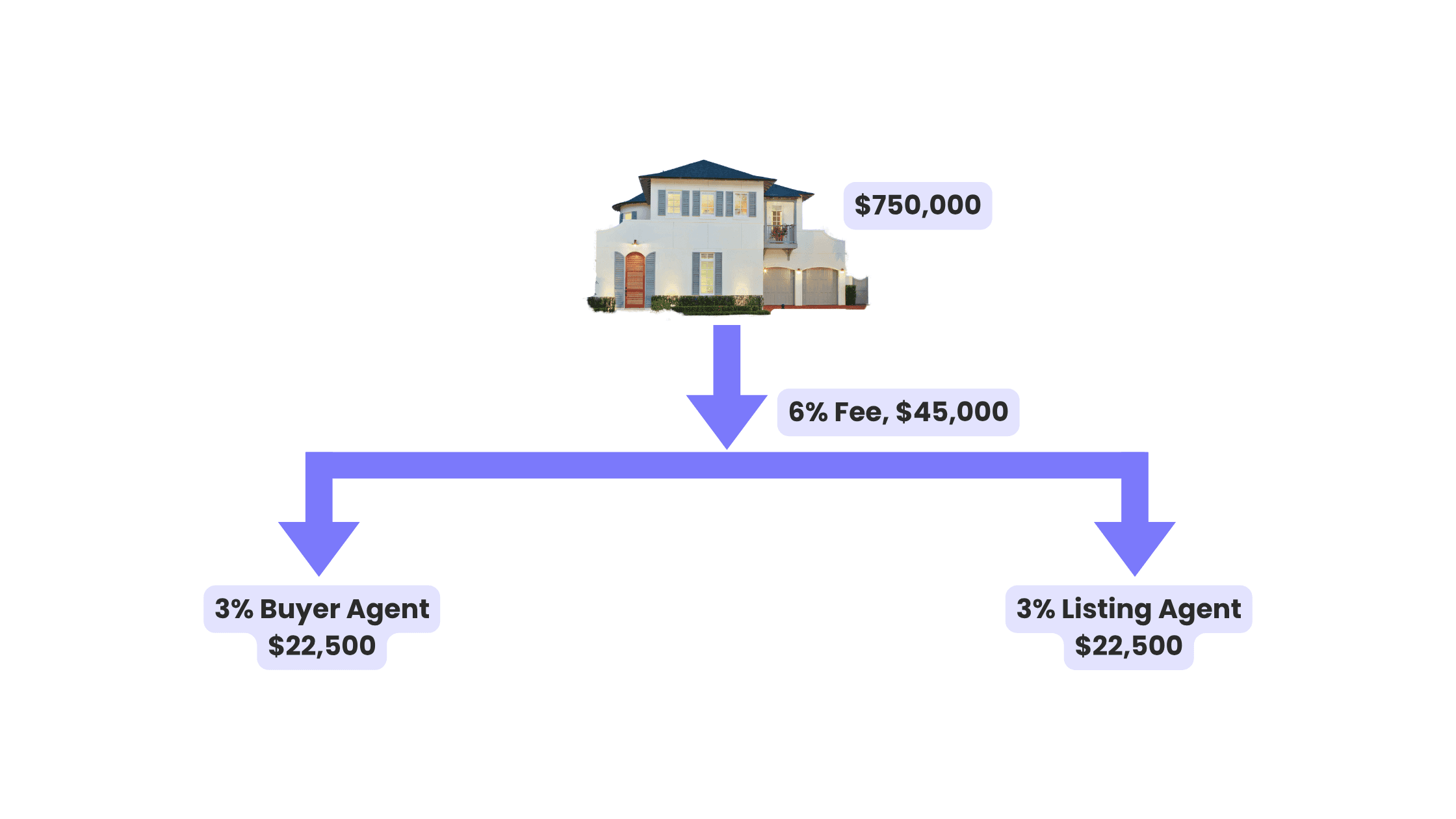
Washington’s Legal Framework for Representation
Washington’s Real Estate Brokerage Relationships Act (RCW 18.86) defines duties that brokers owe to clients and clarifies how agency arises, how dual agency is handled, and how compensation can be paid.
It codifies obligations of loyalty, disclosure, confidentiality, reasonable care, and accounting, and it ensures consumers receive a pamphlet describing these relationships.
Crucially for buyers, the law permits the return of compensation to the consumer in the form of a real estate commission rebate, which is why Washington State real estate is frequently cited as buyer-friendly among jurisdictions that have considered whether rebates distort competition or enhance it.
Because Washington state permits rebates, buyers can negotiate a structure that places part of the compensation back on their side of the ledger to offset closing costs. Washington State homebuyers must plan for and to reduce the principal amount they finance, which in turn lowers interest paid over the life of the loan.
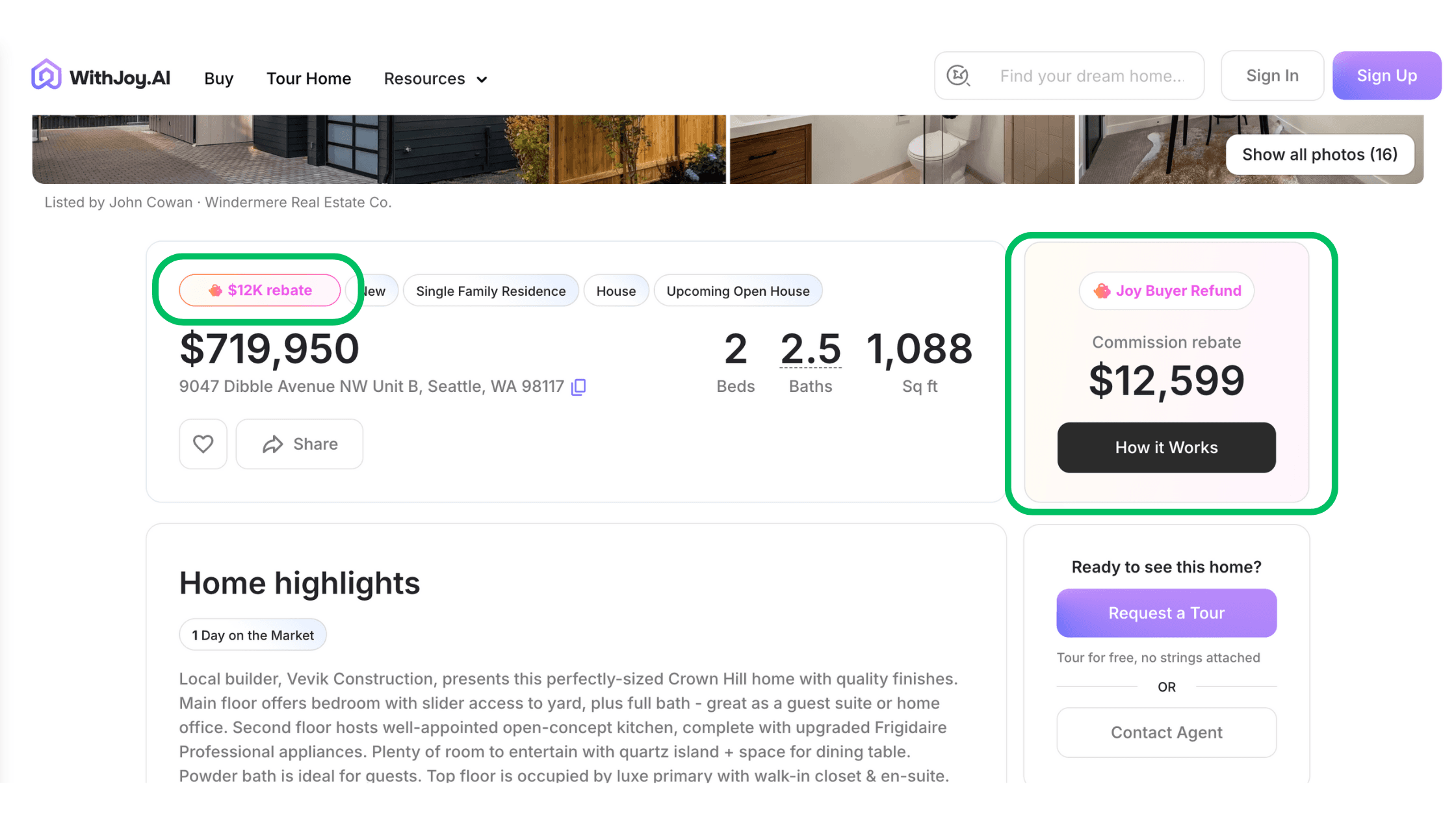
Who Really Pays The Commission? The Economic Answer
When a buyer asks do buyers pay real estate agents, the economic answer begins with the way prices form in open markets.
- Sellers and listing agents set a price that assumes compensation will be paid out of the seller’s proceeds.
- Homebuyers decide whether to meet, beat, or counter that price.
- Mortagage Lenders decide whether to fund it.
- Home Appraisers decide whether to support it.
The outcome, recorded and searchable, becomes the comparable sales data that influences the next seller’s behavior and the next buyer’s tolerance for price.
Because the compensation expectation is part of every relevant reference point, it becomes inseparable from the price that buyers carry into debt service.
That is why, when buyers want to minimize costs, the most efficient lever is not to reject representation (a strategy that tends to shift risk onto the consumer).
But to retain representation while reclaiming part of the cost through a commission rebate structure that is allowed in states like Washington that directly reduces real estate buyer closing costs and indirectly lowers the financed principal.
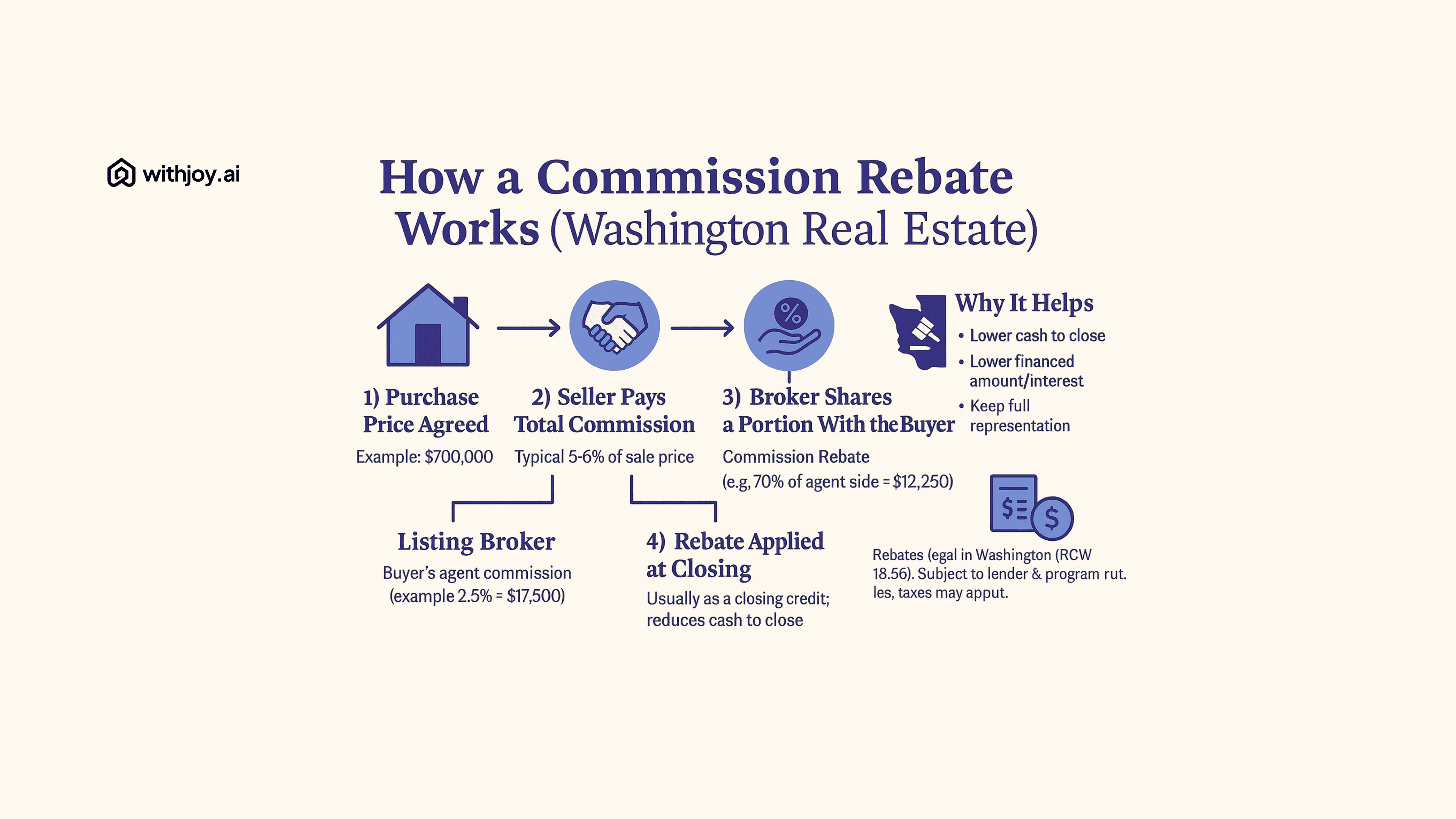
The Hidden Cost and Its Long-Term Effects
Mortgage math makes hidden costs painful. If you add $25,000 to a price to accommodate real estate agent fees, and if that $25,000 is financed over thirty years at a typical fixed rate, the total cash outflow over time is far larger than the nominal commission.
The phrase do buyers pay real estate agents therefore functions less like a yes-or-no query and more like a prompt to examine compounding. Buyer families in King County see the effect in monthly budgets, while households in Spokane County feel the pressure in a different way because the baseline prices differ, but the mechanism is the same: The financed portion of the commission earns interest for the lender unless the buyer reduces price, receives money back through a real estate commission rebate, or brings more cash to close.
For consumers and regulators who care about affordability, this is not a moral judgment about compensation; it is a straightforward observation that the design of the system allocates cost and interest to the party with the least visibility into how that cost was set.

Rebates as a Policy-Positive Consumer Tool
Because Washington allows rebates, the policy question becomes whether they help buyers make better decisions. The most practical answer is that rebates put liquidity in a buyer’s hands exactly when liquidity is scarcest: at funding and at move-in.
A commission rebate style credit in WA can be applied against prepaid items and escrow fees; lender policies may permit a direct credit toward principal reduction; and in cash-rich situations, a check can be cut post-closing subject to program rules.
Washington homebuyers working with discount brokerages like Withjoy.AI have aligned this tool with their negotiating posture by capturing a portion of the buyer’s agent commission while maintaining full representation, which protects contingencies, deadlines, and disclosures.
For many households, it meaningfully reduces closing costs, Washington State buyers otherwise cover with after-tax income. A family purchasing in the Eastside corridor illustrated the point when they secured a rebate large enough to fund custom window coverings and a heat-pump upgrade costs that would have otherwise been carried on credit cards at significantly higher APRs.
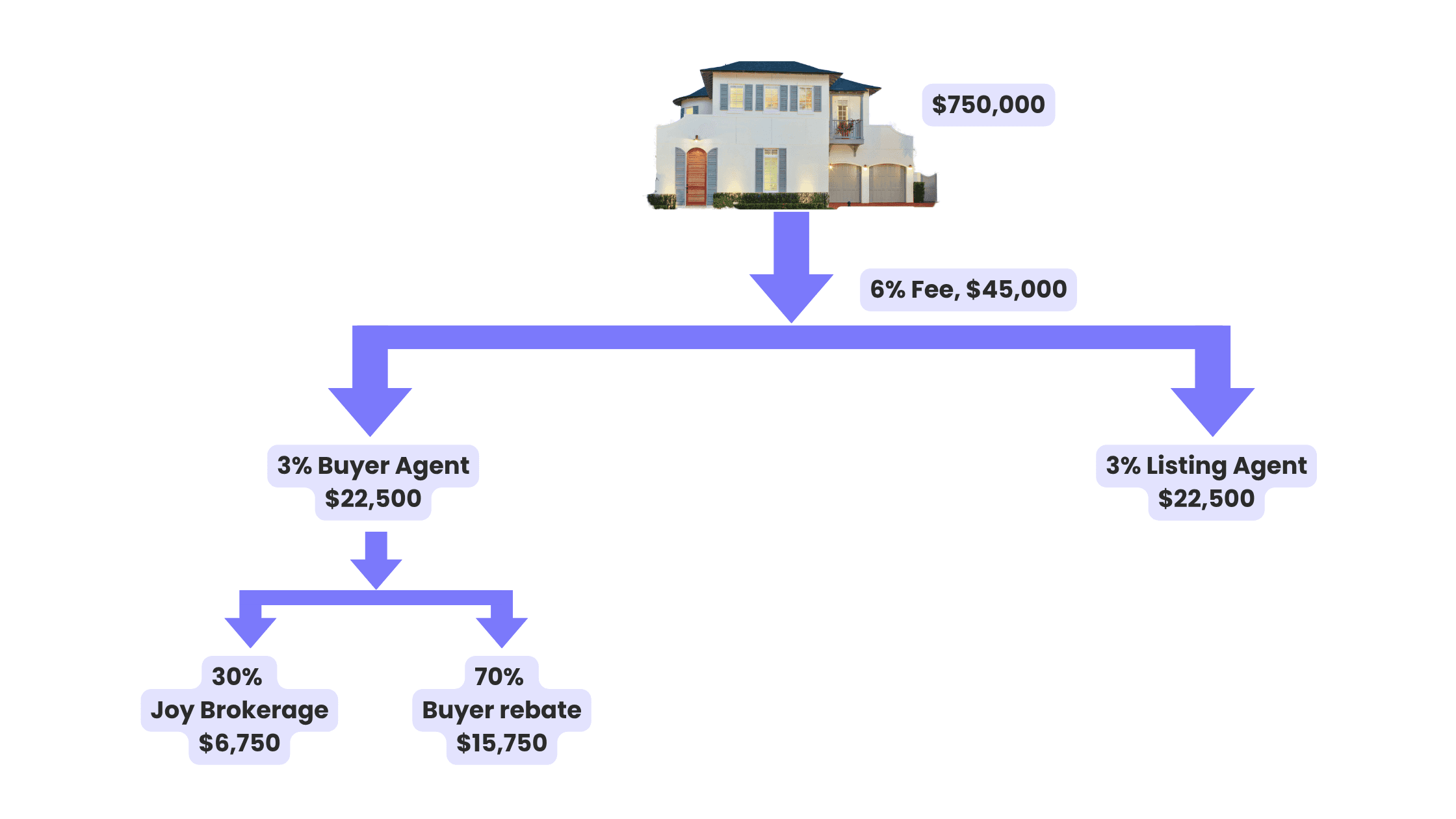
Commission Rebate
Adjust slider to see your rebate amount! Based on a 3% commission.
Home price:
$700K
$100K
$500K
$1M
$1.50M
$0
The Buyer’s Journey From Pre-Approval to Recording
Every step of the home buying process Washington buyers traverse contains information about cost. Pre-approval reveals how debt-to-income ratios respond to small changes in price.
Touring teaches how seller pricing strategies relate to competing inventory. Offer drafting brings compensation discussion into the open because buyers now must sign a representation agreement that describes how the buyer’s agent commission is earned and how it will be paid.
Inspection and appraisal surface the way concessions interact with lender overlays, and escrow demonstrates how disbursement instructions carry out the parties’ promises.
When the county records the deed and deed of trust, the transaction is complete, but the cost story continues in the amortization schedule, where the financed portion of real estate agent fees becomes a stream of interest payments.
A consumer who asks do buyers pay real estate agents at the beginning is therefore asking, indirectly, whether there is a way to design the journey so that less of the commission ends up in the loan balance; the answer, in Washington, is yes, use a real estate commission rebate and negotiate fiercely on total price.
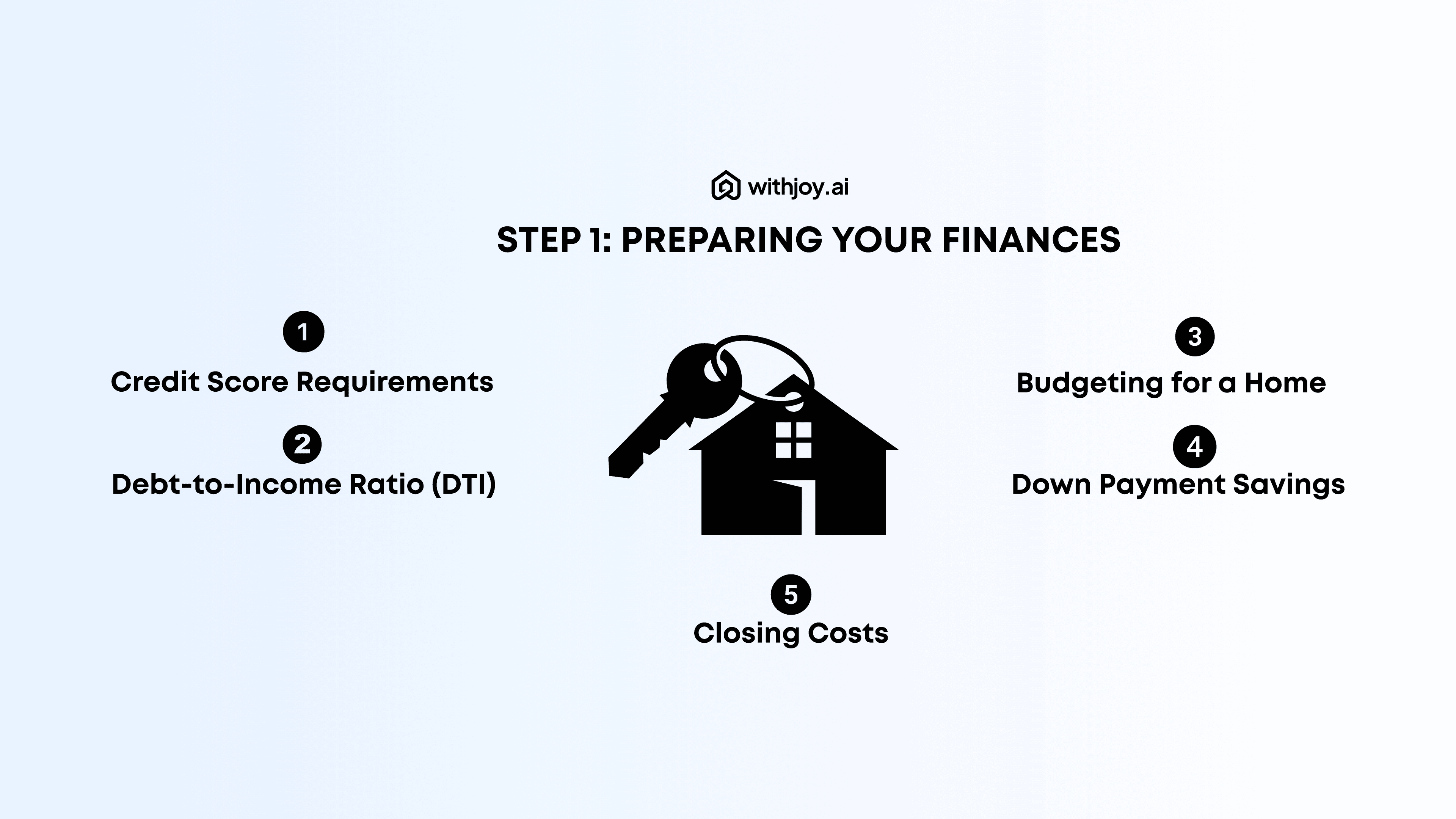
Misconceptions That Distort Buyer Decisions
Two myths stubbornly persist in conversations with first-time purchasers.
The first myth is that representation is free; in reality, the buyer pays for representation inside the price, which is why the phrase "do buyers pay real estate agents" should be read as a lens for understanding price formation rather than as a billing inquiry.
The second myth is that commissions are fixed, which is untrue; compensation is always negotiable in Washington & other States, and it can be expressed as a percentage, a flat rate, or a hybrid, and it can be re-allocated between sides when parties agree.
A third mistake is thinking the only way to save is to decline representation, which in practice exposes a consumer to a series of failure modes ranging from undiscovered defects to mangled contingencies.
A more intelligent approach is to keep expertise and lower cost: negotiate price, capture a commission rebate credit, and use that credit against closing costs that otherwise drain cash reserves.
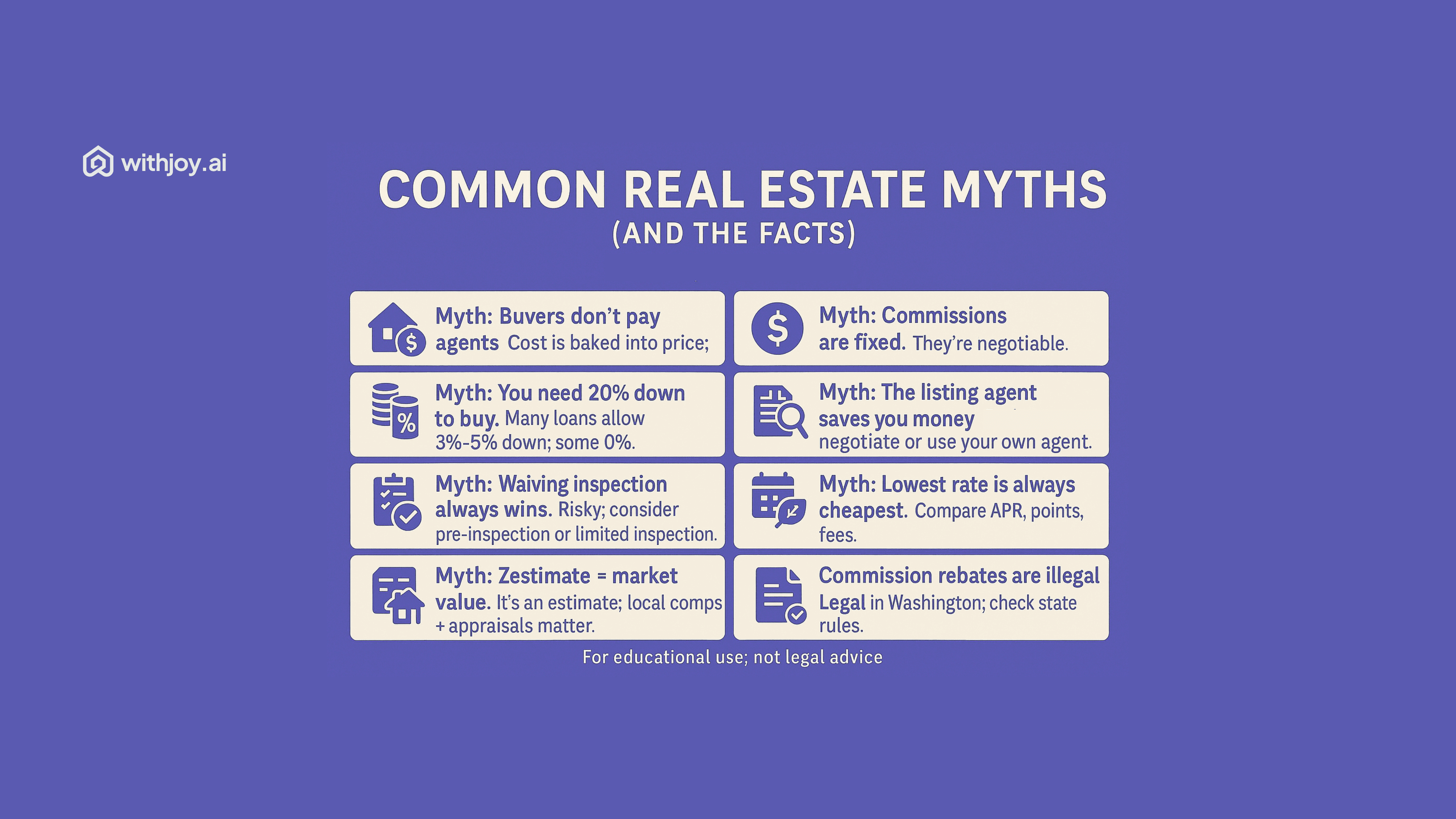
A Homebuyer Case Studies From Washington & Buyer Testimonials
The Eastside example is instructive because Bellevue real estate combines high prices with exacting buyer expectations regarding schools and commute times.
When a young professional couple won a listing after a quiet week on market, their representation structured a real estate commission rebate that returned several points of the buyer’s agent commission at closing.
That credit offset closing costs Washington State buyers must satisfy while also funding an immediate installations. The couple’s lender re-issued the closing disclosure reflecting the reduced cash to close, and the amortization schedule’s first payment was smaller than it would have been without the credit.
Across the Cascades, a family evaluating Spokane homes for sale found a mid-century property with a finished basement and an oversized yard. Their agent explained that comparable sales supported a lower price than list and that a targeted concession would do more for the family’s cash position than a small price reduction because the concession would travel directly to escrow’s accounting.
They requested a seller credit complimented by a commission rebate structure, and together those credits paid real estate buyer closing costs that otherwise would have been drawn from savings.
For a data-driven look at inventory and pricing pressure, the Seattle housing market 2025 has shown how sharply buyers react to reductions in mortgage rates and to expansions in tech employment.
In that environment, the way consumers talk about real estate agent fees changes quickly because price levels re-anchor expectations of what monthly payments should be.
As competition flares, expertise in offer sequencing and contingency design becomes worth more, and the buyer’s agent commission that pays for that expertise becomes easier to justify, especially when coupled with a real estate commission rebate that returns cash at closing.
Rated by satisfied customers
Reviews from our Homebuyers
What Consumers Mean When They Ask “How Much Do Real Estate Agents Make?”
It is natural for a consumer to ask how much do real estate agents make, and the honest answer is that gross commission dollars are not net income.
The compensation that flows to a firm must cover E&O insurance, MLS dues, technology stacks, brokerage rent or virtual infrastructure, marketing, compliance staff, and taxes, after which the firm pays its licensee per their agreement.
What matters for buyers is not the gross figure but the value delivered at the margin of the transaction where risk concentrates: property discovery when inventory is thin, negotiation precision when multiple offers appear, inspection strategy when defects are discovered, and contract management when deadlines stack up.
In that context, the question do buyers pay real estate agents is best reframed as “what value does representation create, and how do I capture part of that value back into my side of the ledger,” to which the most Washington-specific answer is “structure and receive a real estate commission rebate and negotiate price while preserving quality of service.”

International Comparisons and Why Washington Differs
In the United Kingdom, solicitors perform much of the work that agents and escrow perform in Washington, and compensation structures lead sellers to pay listing firms at lower percentages than the U.S. norm.
In Canada, many provinces resemble the U.S. model, but regulatory emphasis on transparent disclosures has shaped consumer expectations differently.
Australia often concentrates on the listing-side relationship with lower headline percentages. These jurisdictions reveal that there is nothing inevitable about any single model; the reason Washington State real estate can combine full representation with a real estate commission rebate is because the state chose a permissive stance that views rebates as pro-consumer rather than as distortive.
For buyers deciding whether they can buy a house without a realtor WA allows that choice, but those who go without representation often discover that the savings they imagined are offset by the price they pay in defects missed or in contractual leverage lost.

Technology, Transparency, and the Next Five Years for Agent Commissions
In the coming half-decade, Washington consumers will continue to sign clear agency agreements that specify how the buyer’s agent commission will be handled, and they will continue to use AI-driven tools that surface inventory, forecast days on market, and simulate payments given live-rate updates.
These tools will not remove the need for a negotiator who can manage escrow sequences and coordinate specialists; they will, instead, make it easier to explain and to rationalize how real estate agent fees are earned.
The culture around do buyers pay real estate agents will evolve in the direction of precision: buyers will understand where compensation originates and how to reclaim a portion through a commission rebate in Washington & other states that support the model, and sellers will understand that transparency about compensation and incentives tends to accelerate discovery of the true clearing price.
Video, Email, and Free Download Resources
To help you internalize these concepts, our experts at Withjoy.AI includes a video that demonstrates the pricing mechanics with a sample closing disclosure and then shows how a real estate commission rebate interacts with lender overlays and escrow accounting.
The companion email subcription, delivered weekly, curates local market signals from Washington State real estate sources and answers practical questions like whether it makes sense to request a concession or to pursue a price reduction first in a given week’s climate.
The free downloadable handbooks, written for first-time purchasers, includes chapters on real estate buyer closing costs, a section on the home buying process.
Washington lenders prefer to see documented in pre-approval packages, and a checklist of closing costs, Washington State escrow teams collect at funding.
Video: Watch the explainer and see a real example of a buyer’s agent commission flowing through escrow, then see how a commission rebate in Washington credit reduces net cash to close.
Subscribe for weekly Insights
Learn about pricing briefs and lender overlays etc.
Get the free handbook, including a worksheet to plan real estate buyer closing costs and a primer on rebate documentation for your file.

Internal Cross-Links for Buyers Who Want a Deeper Dive
The first is a detailed tutorial on the home buying process in Washington consumers follow from intent letter to recording, with lender-ready templates.
The second is a savings calculator that illustrates how a real estate commission rebate changes lifetime cost compared to a simple price reduction of the same nominal value.
The third is a comprehensive reference on closing costs Washington State buyers encounter, organized by county so you can anticipate how local taxes and title fees change.
For regional flavor, we also maintain up-to-date market notes on Bellevue real estate and periodic affordability spotlights using sample inventory drawn from Spokane homes for sale; and we publish a quarterly outlook that frames price dynamics by sector in the Seattle housing market 2025 and beyond. If you are interviewing firms, we recommend reading our page on how to evaluate the best real estate agents in WA, which sets out questions that reveal process discipline and client-advocacy culture.
Related Articles

Washington Housing Market In 2025: Home Prices & Trends
Washington State's housing market in 2025 is strong and giving buyers fresh hope. From the tech-driven energy of Seattle to the peaceful neighborhoods of Olympia, buyers are returning with new plans and smarter tools. Whether you’re a first-time buyer or eyeing a move-up home, this year’s market holds opportunity, if you know where to look!

Seattle Housing Market
Seattle, Washington, is renowned for its vibrant tech industry, stunning natural landscapes, and dynamic urban culture. However, its housing market has become a focal point of discussion due to high costs, fluctuating trends, and affordability challenges. This article provides an in-depth exploration of the Seattle housing market in 2025, covering median home prices, property values, real estate trends, housing affordability, and market forecasts, supported by data, charts, and expert insights. Whether you're considering buying a home in Seattle, investing, or simply curious about Seattle real estate prices, this analysis offers a detailed roadmap.

Real Estate Commission Rebates Explained
Almost all homebuyers leave money on the table.. don’t be one of them!!
Practical Guidance for Buyers Considering FSBO or No-Agent Paths
It is understandable to ask whether you can buy a house without a realtor WA; the law permits it, and some households especially repeat buyers with construction or legal backgrounds have navigated it successfully.
The trade-off is that, absent representation, you must perform discovery, negotiation, contingency design, deadline management, and vendor coordination alone, and you must also decide what to do about the buyer’s agent commission offered in the listing, which, if declined, may stay with the listing firm unless negotiated otherwise.
The low-friction path is to retain representation, insist on price transparency, and contract for a commission rebate Washington credit so that your representative’s incentives are aligned with your objective to reduce real estate buyer closing costs and to compress the principal that would otherwise accumulate interest.
FAQ (Q&A format)
Q: Do buyers pay real estate agents in Washington?
A: Buyers do not write a separate check to an agent at closing, but the price used to underwrite the mortgage includes compensation for both firms, which means the buyer finances the cost and therefore pays it over time. This is why the phrase do buyers pay real estate agents should be treated as a question about pricing mechanics, not a question about who physically signs a check.
Q: What exactly is the buyer’s agent commission?
A: The buyer’s agent commission is the portion of total compensation allocated to the cooperating firm that represents the buyer; in Washington it may be offered in the listing or negotiated in the purchase process, and it can be adjusted by agreement when parties restructure price and concessions.
Q: Are real estate agent fees negotiable?
A: Yes. In Washington, compensation is always negotiable, and buyers can combine price strategy with a real estate commission rebate to reduce financed cost and to offset real estate buyer closing costs.
Q: Can a rebate reduce my cash to close?
A: Yes. A commission rebate Washington credit can offset items on the closing disclosure, subject to lender and program rules, and thereby lower closing costs Washington State buyers must fund from savings.
Q: Is it smart to buy a house without a realtor WA permits?
A: The law allows consumers to buy a house without a realtor WA buyers sometimes try, but most households are better served by representation paired with a rebate that returns part of the buyer’s agent commission and keeps risk management in professional hands.

Conclusion
The meaningful version of the question do buyers pay real estate agents is not about who authorizes disbursement on the settlement statement but about who carries the cost through the mortgage and through interest accrual.
Because Washington State real estate permits the real estate commission rebate, buyers have a practical, lawful way to realign incentives so that representation remains strong while cash to close and lifetime financed cost come down.
If you are planning a purchase, watch the explainer video, download the handbook, and subscribe to the weekly note; then, when you interview firms, ask exactly how the buyer’s agent commission will be handled and how the rebate will be documented.
If you want a place to begin, schedule a consultation, compare our modeling against what you have seen elsewhere, and decide whether a rebate-driven strategy meets your family’s needs in Bellevue real estate, in neighborhoods highlighted under Spokane homes for sale, and in the shifting context of the Seattle housing market 2025.
Why More Washington Buyers Are Choosing WithJoy.AI?
If you're looking to save thousands on your next home purchase, there's a smarter way to buy: WithJoy.AI.
🏡 A Discount Real Estate Agent That Works for You
WithJoy.AI is a next-gen platform offering discount real estate services in Washington without cutting corners on expertise or service quality. Our technology connects you with expert, local agents while drastically reducing your commission costs.
💸 Real Estate Commission Rebates That Put Cash in Your Pocket
Unlike traditional brokerages, WithJoy.AI offers one of Washington's best home buyer rebate programs, helping you get a significant cashback on home purchase. You can get up to 70% of your buyer agent's commission refunded that’s thousands of dollars back to you.
🤖 Smart, Streamlined Homebuying
Our AI platform helps you: Discover properties faster, Schedule instant home tours, Craft smarter offers with confidence
💬 Why Buyers Are Making the Switch
Whether you're searching for a discount real estate agent, need a real estate commission rebate, or simply want a better way to buy, WithJoy.AI gives you everything you need without the unnecessary costs.
✅Save Money. Buy Smarter.Explore homes and claim your realtor commission rebate at WithJoy.AI. Washington’s top discount real estate brokerage is just a click away.

